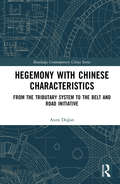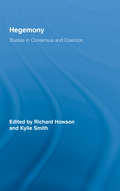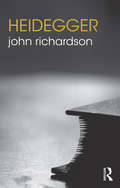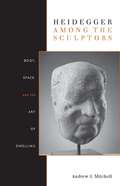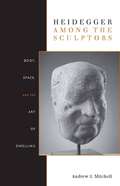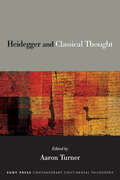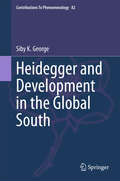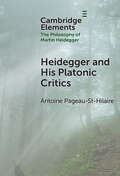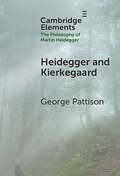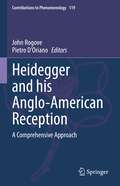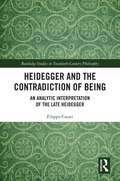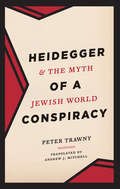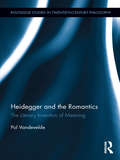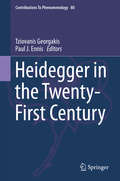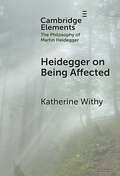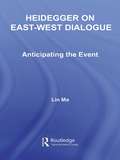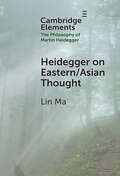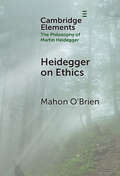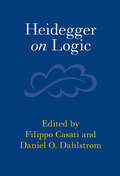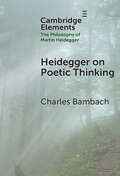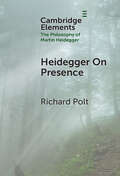- Table View
- List View
Hegemony with Chinese Characteristics: From the Tributary System to the Belt and Road Initiative (Routledge Contemporary China Series)
by Asım DoğanHegemony with Chinese Characteristics compares the historical relationship of China with its neighbours to the developing trajectory of the Belt and Road Initiative, and asks what this tells us about the kind of hegemon China is likely to become. China is going to play a more active and decisive role in the international community and there is much uncertainty about how China will handle its responsibilities and interests. The ambiguous and assertive Belt and Road Initiative is a matter of special concern in this aspect. The Tributary System, which provides concrete evidence of how Chinese dynasties handled relations with foreigners, is a useful reference point in trying to understand its twenty-first century developments. This is particularly true, because after the turbulence of the "Century of Humiliation" and the Maoist Era, China seems to be explicitly re-embracing its history and its pre-revolutionary identity. Confucius, one of the biggest targets of the Cultural Revolution, is being rehabilitated alongside Confucianism, Taoism, Buddhism and other ideologies and philosophies suppressed in the Mao era. Doğan analyzes the extent to which China’s current approach to foreign relations resembles its earlier models. Grounded in "hegemony" as an analytic lens, this book provides an innovative study of the power generated by the global rise in China. It will be a valuable resource for scholars and students of Chinese foreign policy and international relations and serve as a benchmark for further studies.
Hegemony: Studies in Consensus and Coercion (Routledge Studies in Social and Political Thought #Vol. 56)
by Kylie Smith Richard HowsonThe originality and depth of Gramsci's theory of hegemony is now evidenced in the wide-ranging intellectual applications within a growing corpus of research and writings that include social, political and cultural theory, historical interpretation, gender and globalization. The reason that hegemony has been so widely and diversely adopted lies in the unique way that Gramsci formulated the 'problematics' of structure/superstructure, coercion/consensus, materialism/idealism and regression/progression within the concept hegemony. However, in much of the contemporary literature the full complexity of hegemony is either obfuscated or ignored. Hegemony, through comprehensive and systematic analyses of Gramsci's formulation, a picture of hegemony as a complex syncretism of these dichotomies. In other words, hegemony is presented as a concept that is as much about aspiration and progressive politico-social relations as it is about regressive and dominative processes. Thus, the volume recognises and presents this complexity through a selection of contemporary theoretical as well as historico-social investigations that mark a significantly innovative moment in the work on hegemony.
Heidegger (The Routledge Philosophers)
by John RichardsonMartin Heidegger is one of the twentieth century’s most influential, but also most cryptic and controversial philosophers. His early fusion of phenomenology with existentialism inspired Sartre and many others, and his later critique of modern rationality inspired Derrida and still others. This introduction covers the whole of Heidegger’s thought and is ideal for anyone coming to his work for the first time. John Richardson centres his account on Heidegger’s persistent effort to change the very kind of understanding or truth we seek. Beginning with an overview of Heidegger’s life and work, he sketches the development of Heidegger’s thought up to the publication of Being and Time. He shows how that book takes up Husserl’s method of phenomenology and adapts it. He then introduces and assesses the key arguments of Being and Time under three headings—pragmatism, existentialism, and temporality—its three levels of analysis of human experience. Subsequent chapters introduce Heidegger’s later philosophy, including his turn towards a historical account of being, and new ideas about how we need to ‘think’ to get the truth about it; his influential writings on language, art, and poetry, and their role in the Western history of being; and his claim that this history has culminated in a technological relation to things that is deeply problematic, above all in the way it excludes the divine. The final chapter looks at Heidegger’s profound influence on several intellectual movements ranging from phenomenology to existentialism to postmodernism. A much-needed and refreshing introduction to this major figure, Heidegger is ideal reading for anyone coming to his work for the first time and will interest and stimulate students and scholars alike.
Heidegger Among the Sculptors
by Andrew MitchellIn the 1950s and 60s, Martin Heidegger turned to sculpture to rethink the relationship between bodies and space and the role of art in our lives. In his texts on the subject-a catalog contribution for an Ernst Barlach exhibition, a speech at a gallery opening for Bernhard Heiliger, a lecture on bas-relief depictions of Athena, and a collaboration with Eduardo Chillida--he formulates his later aesthetic theory, a thinking of relationality. Against a traditional view of space as an empty container for discrete bodies, these writings understand the body as already beyond itself in a world of relations and conceive of space as a material medium of relational contact. Sculpture shows us how we belong to the world, a world in the midst of a technological process of uprooting and homelessness. Heidegger suggests how we can still find room to dwell therein. Filled with illustrations of works that Heidegger encountered or considered, Heidegger Among the Sculptors makes a singular contribution to the philosophy of sculpture.
Heidegger among the Sculptors: Body, Space, and the Art of Dwelling
by Andrew J. MitchellMartin Heidegger turned to sculpture to rethink the relationship between bodies and space and the role of art in our lives. In his texts on the subject, a catalog contribution for an Ernst Barlach exhibition, a speech at a gallery opening for Bernhard Heiliger, a lecture on bas-relief depictions of Athena, and a collaboration with Eduardo Chillidahe formulates his later aesthetic theory, a thinking of relationality.
Heidegger and Classical Thought (SUNY series in Contemporary Continental Philosophy)
by Aaron TurnerDespite a sustained and fruitful relationship with the classical philologists of his day, Martin Heidegger's status among classicists has long since been strained, especially in the Anglophone tradition. Heidegger and Classical Thought reemphasizes both Heidegger's importance to classical discourse and the significance of classical discourse for Heidegger's own work. The essays found in this book demonstrate the depth and breadth of Heidegger's engagement with classical thought throughout his life, from his early engagements with Aristotle and Plato to his profound readings of the early Greek thinkers. At the same time, this book shows how reading Heidegger's interpretation of classical thought offers new and innovative ways to approach and study antiquity.
Heidegger and Development in the Global South
by Siby K. GeorgeTaking the Heideggerian critical ontology of technology as its base, this volume looks at postcolonial modernization and development in the global south as the worldwide expansion of the western metaphysical understanding of reality. We live today in an increasingly globalizing technological society that Martin Heidegger described in the middle of the last century as 'the planetary imperialism of technologically organized man. ' Consequent upon this cultural-intellectual globalization, the ahistorical, violent, individualistic, calculative and capitalistic logic of the metaphysics of technology is permeating the life-world, even of the world's poorest peoples, in ways they could neither choose nor control. This volume questions the political ethics and justice of post-war development discourse in the light of the egalitarian aims of modern societies, cultural freedom of communities and nations and the ecological limits of the planet. The final chapters discuss the alternative proposal of development as various conceptions of good life and equitable human flourishing amidst equally flourishing non-human life and non-living beings. This unique volume is the first book-length treatment of the ontology of modernization and development in the global south from a Heideggerian stance.
Heidegger and His Platonic Critics (Elements in the Philosophy of Martin Heidegger)
by Antoine Pageau-St-HilaireThis Element introduces the arguments of three prominent Platonic critics of Heidegger – Leo Strauss (1899–1973), Hans-Georg Gadamer (1900–2002), and Jan Patočka (1907–1977) – with the aim of evaluating the trenchancy of their criticisms. The author shows that these three thinkers uncover novel ways of reading Plato non-metaphysically (where metaphysics is understood in the Heideggerian sense) and thus of undermining Heidegger's narrative concerning Platonism as metaphysics and metaphysics as Platonism. In their readings of the Platonic dialogues, Plato emerges as a proto-phenomenologist whose attention to the ethical-political facticity of human beings leads to the acknowledgment of human finitude and of the fundamental elusiveness of Being. These Platonic critics of Heidegger thus invite us to see in the dialogues a lucid presentation of philosophic questioning rather than the beginning of distorting doctrinal teachings.
Heidegger and Kierkegaard (Elements in the Philosophy of Martin Heidegger)
by George PattisonThe work examines the presence and significance of Kierkegaard in Heidegger's work. After setting out the context of Heidegger's reception of the Danish thinker and examining his likely knowledge of his writings, the work first examines key Kierkegaardian concepts that are explicitly present in Being and Time, including existence, 'idle talk' (Gerede), anxiety, the moment of vision, repetition, and the existential significance of death. It is seen that Heidegger regarded Kierkegaard as an essentially religious writer whose work was only indirectly relevant to Heidegger's own project of fundamental ontology. Subsequently, the work considers the place of Kierkegaard in Heidegger's writings from the 1930s onwards, concluding with consideration of the paper Heidegger submitted for the 1963 Paris UNESCO conference marking the 150th anniversary of Kierkegaard's thought.
Heidegger and Unconcealment
by Mark A. WrathallThis book includes ten essays that trace the notion of unconcealment as it develops from Heidegger's early writings to his later work, shaping his philosophy of truth, language, and history. "Unconcealment" is the idea that what entities are depends on the conditions that allow them to manifest themselves. This concept, central to Heidegger's work, also applies to worlds in a dual sense: first, a condition of entities manifesting themselves is the existence of a world; and second, worlds themselves are disclosed. The unconcealment or disclosure of a world is the most important historical event, and Heidegger believes there have been a number of quite distinct worlds that have emerged and disappeared in history. Heidegger's thought as a whole can profitably be seen as working out the implications of the original understanding of unconcealment.
Heidegger and his Anglo-American Reception: A Comprehensive Approach (Contributions to Phenomenology #119)
by John Rogove Pietro D’OrianoThis book presents both a historical overview of the absorption of Heidegger’s thought into English-language philosophical schools as well as a philosophical discussion of his thought provided by contemporary scholars. The text describes the ways in which a philosophical methodology and worldview seemingly so inhospitable to Anglophone academia has managed to find an unlikely home.This volume is roughly divided into two types of contributions: discussions of Heidegger’s reception in the English-speaking world, and outstanding examples of English-language Heidegger scholarship. The first type includes both historiographical accounts of the encounters between Heidegger’s thought and the Anglo-American world, as well as their philosophical expositions and critiques. The second group of chapters reveal the latest contemporary scholarship by contemporary Heideggerians writing in English. It is moreover the first volume to bring together thinkers from both genealogies of Anglo-American Heideggerianism appealing to students and researchers working in both of these camps.
Heidegger and the Contradiction of Being: An Analytic Interpretation of the Late Heidegger (Routledge Studies in Twentieth-Century Philosophy)
by Filippo CasatiThis book offers a clear, analytic, and innovative interpretation of Heidegger’s late work. This period of Heidegger’s philosophy remains largely unexplored by analytic philosophers, who consider it filled with inconsistencies and paradoxical ideas, particularly concerning the notions of Being and nothingness. This book takes seriously the claim that the late Heidegger endorses dialetheism – namely the position according to which some contradictions are true – and shows that the idea that Being is both an entity and not an entity is neither incoherent nor logically trivial. The author achieves this by presenting and defending the idea that reality has an inconsistent structure. In doing so, he takes one of the most discussed topics in current analytic metaphysics, grounding theory, into a completely unexplored area. Additionally, in order to make sense of Heidegger’s concept of nothingness, the author introduces an original axiomatic mereological system that, having a paraconsistent logic as a base logic, can tolerate inconsistencies without falling into logical triviality. This is the first book to set forth a complete and detailed discussion of the late Heidegger in the framework of analytic metaphysics. It will be of interest to Heidegger scholars and analytic philosophers working on theories of grounding, mereology, dialetheism, and paraconsistent logic.
Heidegger and the Elements of (Elements in the Philosophy of Martin Heidegger)
by S. Montgomery EwegenBy way of an analysis of Heidegger's use of the elements of earth, water, air, and fire as a means to describe the unfolding of being, this Element offers a novel account of Heidegger's understanding of the human. By covering a variety of texts from the late-20s through the early-50s (including several of his recently published Black Notebooks), this Element demonstrates the manner in which these elements comprise, for Heidegger, the very being of the human.
Heidegger and the Myth of a Jewish World Conspiracy
by Andrew J. Mitchell Peter TrawnyIn 2014, the first three volumes of Heidegger's Black Notebooks--the personal and philosophical notebooks that he kept during the war years--were published in Germany. These notebooks provide the first textual evidence of anti-Semitism in Heidegger's philosophy, not simply in passing remarks, but as incorporated into his philosophical and political thinking itself. In Heidegger and the Myth of a Jewish World Conspiracy, Peter Trawny, the editor of those notebooks, offers the first evaluation of Heidegger's philosophical project in light of the Black Notebooks. While Heidegger's affiliation with National Socialism is well known, the anti-Semitic dimension of that engagement could not be fully told until now. Trawny traces Heidegger's development of a grand "narrative" of the history of being, the "being-historical thinking" at the center of Heidegger's work after Being and Time. Two of the protagonists of this narrative are well known to Heidegger's readers: the Greeks and the Germans. The world-historical antagonist of this narrative, however, has remained hitherto undisclosed: the Jews, or, more specifically, "world Judaism." As Trawny shows, world Judaism emerges as a racialized, destructive, and technological threat to the German homeland, indeed, to any homeland whatsoever. Trawny pinpoints recurrent, anti-Semitic themes in the Notebooks, including Heidegger's adoption of crude cultural stereotypes, his assigning of racial reasons to philosophical decisions (even undermining his Jewish teacher, Edmund Husserl), his endorsement of a Jewish "world conspiracy," and his first published remarks on the extermination camps and gas chambers (under the troubling aegis of a Jewish "self-annihilation"). Trawny concludes with a thoughtful meditation on how Heidegger's achievements might still be valued despite these horrifying facets. Unflinching and systematic, this is one of the most important assessments of one of the most important philosophers in our history.
Heidegger and the Romantics: The Literary Invention of Meaning (Routledge Studies in Twentieth-Century Philosophy)
by Pol VandeveldeWhile there are many books on the romantics, and many books on Heidegger, there has been no book exploring the connection between the two. Pol Vandevelde’s new study forges this important link. Vandevelde begins by analyzing two models that have addressed the interaction between literature and philosophy: early German romanticism (especially Schlegel and Novalis), and Heidegger’s work with poetry in the 1930s. Both models offer an alternative to the paradigm of mimesis, as exemplified by Aristotle’s and Plato’s discussion of poetry, and both German romanticism and Heidegger owe a deep debt to Plato. The study goes on to defend the view that Heidegger was influenced by romanticism. The author’s project is thus both historical, showing the specificity of the romantic and Heideggerean works, and systematic, defending aspects of their alternative mode of thinking while also pointing to their weaknesses.
Heidegger in the Twenty-First Century
by Tziovanis Georgakis Paul J. EnnisThe current volume is comparative and inter-disciplinary, and it provides a reflection on what thinking might become after Heidegger's philosophy. Its aim is to critically expand the current field of research by presenting unfamiliar and unchartered avenues that will guide and carry the Heidegger scholarship into the twenty-first century. By doing so, it addresses fundamental questions in the Heideggerian scholarship, including its problems, restraints, and future direction. It also engages and broadens the increasingly disparate approaches to Heidegger's work, whether those approaches are traditional in their employment of phenomenology and hermeneutics or whether they apply to Heidegger's thinking in new and surprising ways. The first section of the volume emphasizes the importance of methodology for the future of Heidegger studies while the second section examines the historical, ethical and vocal-poetical in Heidegger's thought and draws conclusions relevant to the Heidegger scholar of today. The final section demonstrates Heidegger's appeal to a variety of other discourses besides philosophy and the way his thinking could be creatively approached, utilized and implemented in our century. Contributions come from cutting-edge scholars such as Babette E. Babich, Dermot Moran, François Raffoul and Trish Glazebrook.
Heidegger on Being Affected (Elements in the Philosophy of Martin Heidegger)
by Katherine WithyThings get to us. We are moved or affected by 'things' in the ordinary sense=the paraphernalia of our daily lives-and also by ourselves, by others, and by ontological phenomena such as being and time. How can such things get to us? How can things matter to me? Heidegger answers this question with his concepts of finding (Befindlichkeit) and attunement (Stimmung). This Element explores how being finding allows things to matter to us in attunements such as fear and hope by allowing those things to show up as benefits or detriments to our pursuits and so to put those pursuits at stake. It also explores how we can be affected ontologically-that is, affected by being-in special attunements such as angst and boredom, as well as how Heidegger's account of being affected has contributed to our understanding of emotions, moods, and affective disorders.
Heidegger on Being Uncanny
by Katherine WithyThere are bizarre moments when we feel like strangers to ourselves. Through an investigation of Heidegger's concept of uncanniness, Katherine Withy explores what such experiences reveal. She shows that we can be what we are only if we do not fully understand what it is to be us, and points toward what it is to live well as an uncanny human being.
Heidegger on Concepts, Freedom and Normativity
by Sacha GolobThis book offers a fundamentally new account of the arguments and concepts which define Heidegger's early philosophy, and locates them in relation to both contemporary analytic philosophy and the history of philosophy. Drawing on recent work in the philosophy of mind and on Heidegger's lectures on Plato and Kant, Sacha Golob argues against existing treatments of Heidegger on intentionality and suggests that Heidegger endorses a unique position with respect to conceptual and representational content; he also examines the implications of this for Heidegger's views on truth, realism and 'being'. He goes on to explore Heidegger's work on the underlying issue of normativity, and focuses on his theory of freedom, arguing that it is freedom that links the existential concerns of Being and Time to concepts such as reason, perfection and obligation. His book offers a distinctive new perspective for students of Heidegger and the history of twentieth-century philosophy.
Heidegger on East-West Dialogue: Anticipating the Event
by Lin MaThis book traces a most obscure and yet most intriguing theme concealed in Heidegger’s thinking and work, which has hitherto not yet been made the focus of a thorough and sustained investigation: that is, the emergence and course of Heidegger’s interest in East Asian thought and of his reflection on East-West dialogue. Lin Ma covers such complex issues as Heidegger’s thoughts on language, Being, technology, the other beginning, and the journey abroad, with a view to their implications for East-West dialogue. It reveals the significance of his remarks on the early Greek’s confrontation with the Asiatic, and presents contextualized interpretations of his fleeting references to the topic of East-West dialogue and of his encounter with the Daodejing. Finally, it delves into "A dialogue on language" and exposes the strains and tensions that accompany Heidegger’s extension of dialogue and the Same, the two notions central to his thought, to the question of East-West dialogue. In the end, Lin Ma concludes that Heidegger’s fundamental concerns and philosophical orientations as articulated in terms of the history of Being and the other beginning have restricted him from engaging more seriously with the irresolvable and yet enduring issue of East-West dialogue.
Heidegger on Eastern/Asian Thought (Elements in the Philosophy of Martin Heidegger)
by Lin MaThis Element elucidates the metamorphoses of Heidegger's comportment toward Eastern/Asian thought from the 1910s to the 1960s. With a view to the many meanings of the East at play in Heidegger's thinking, it considers how his diversified 'dialogues' with the East are embedded in different phases of his Denkweg. Various themes unexplored previously are examined: Heidegger's early treatment of near Eastern traditions and Islamic philosophy, his views on alien cultures, the 'primitive Dasein' and the 'mythical Dasein,' and his meditation on Russianism's deeply rooted spirituality and its recuperative possibilities for the West. Finally, this Element reveals how Heidegger opened the promise of a dialogue with the East and yet stepped back from the threshold, and how his move from the Occidental line of philosophizing toward the Oriental line is integral to his shift from the guiding question of “Being” to the abyssal question of 'Beyng.'
Heidegger on Ethics (Elements in the Philosophy of Martin Heidegger)
by Mahon O'BrienHeidegger is often understood to have forsaken the very possibility of ethics – we find numerous variations of this view in the secondary literature. And yet, in Letter on Humanism, Heidegger stresses the importance of ethics (thought anew as originary ethics) in the context of the dangers posed by the technological age. In this Element, the author will try to unpack what Heidegger might have meant by this. Ultimately, his account of the essence of the human being will prove to be the key to understanding what he describes as 'originary ethics'.
Heidegger on Logic
by Daniel O. Dahlstrom Filippo CasatiDoes adherence to the principles of logic commit us to a particular way of viewing the world? Or are there ways of being – ways of behaving in the world, including ways of thinking, feeling, and speaking – that ground the normative constraints that logic imposes? Does the fact that assertions, the traditional elements of logic, are typically made about beings present a problem for metaphysical (or post-metaphysical) prospects of making assertions meaningfully about being? Does thinking about being (as opposed to beings) accordingly require revising or restricting logic's reach – and, if so, how is this possible? Or is there something precious about the very idea of thinking the limits of thinking? Contemporary scholars have become increasing sensitive to how Heidegger, much like Wittgenstein, instructively poses such questions. Heidegger on Logic is a collection of new essays by leading scholars who critically ponder the efficacy of his responses to them.
Heidegger on Poetic Thinking (Elements in the Philosophy of Martin Heidegger)
by Charles BambachOne of the striking features of Heidegger's philosophical engagement concerns his privileging of poetry and poetic thinking. In this understanding of language as fundamentally poetic, Heidegger puts forward a different way to do philosophy. In this Element, the author places Heidegger's poetic thinking in conversation with Sophocles and Hölderlin as a way to situate his critique of global technology and instrumental thinking in the postwar years. This Element also offers a critique of Heidegger's efforts to arrogate poetic thinking to his own aim of a destinal form of German national self-assertion through poetry. Overall, the aim here is to show how crucial poetic thinking is to the way Heidegger understands philosophy as a radical engagement with language.
Heidegger on Presence (Elements in the Philosophy of Martin Heidegger)
by Richard PoltHeidegger calls the thought that 'being is presence' the 'thunderbolt' that led him to link being and time and inspired his deconstruction of Western metaphysics. However, the scope of the concept of presence varies in his texts; the narrower it is, the more dramatic yet less plausible is his 'thunderbolt.' What is presence? Does Heidegger ultimately reject presence as the meaning of being, or does he accept it if conceived broadly enough? This study surveys the meaning and status of 'presence' in Heidegger. The author argues that he maintains a critical perspective, and that his critique can be applied not only to the tradition as interpreted in his 'history of being,' but also to contemporary phenomena such as information technology.
